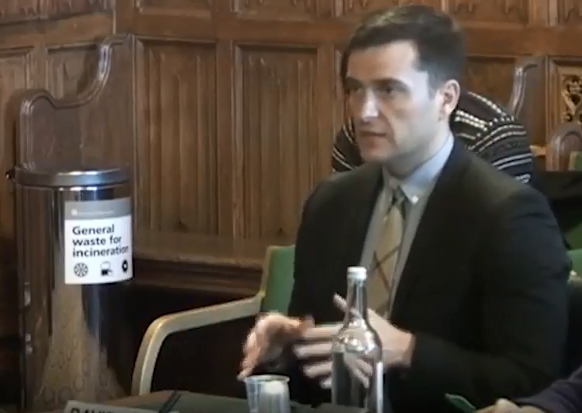On the UK Parliament and fake news
Russian meddling in Catalonia has rightfully caught the attention of legislative bodies around the world. Those of us who have covered the issue have been summoned to explain our conclusions in Madrid, Brussels and London. In december I was called to offer oral evidence by the Fake news inquiry at Westminster, along with Borja Lasheras, from the European Council on Foreign Relations and Mira Milosevich, from Instituto Elcano. When Labor MP Ian C. Lucas asked if there is any evidence of this meddling, the answer was categoric: 'yes'. This is the testimony.
Ian C. Lucas: Do you have evidence that the Russian Government is seeking to interfere with the referendum in Catalonia?
David Alandete: The only evidence that I have as a journalist is that Russian state-affiliated TV organisations have been openly spreading propaganda that benefits those who want independence in Catalonia. That is the only thing, as far as I can—
Ian C. Lucas: I think that is a more interesting answer, because then I am interested in the relationship between the Russian Government and the Russian-affiliated—you were talking about Sputnik.
David Alandete: Yes, fully owned by them.
Ian C. Lucas: And you think that is sanctioned by the Russian Government.
David Alandete: Well, they are funded by the Kremlin and their editor-in-chief is Margarita Simonyan. She is a Russian journalist who is close to Putin. You can do research on her and who appointed her. I would seriously look into RT and Sputnik, what information they do and what they cover here in the United Kingdom about all sorts of issues, because I think it is worth seeing. The State Department in the United States has just requested that they register as foreign agents. Twitter has banned them from buying advertisements, because they think it is propaganda and not advertisement for commercial reasons.
As one might expect, the Russian misinformation machine edited the video to add music, visual effects and... even popcorn. Fake news about the fake news committee: "The Russian plot does tourism in London".
I was not surprised at all by RT's reaction. It's their way and they do it masterfully. But I was indeed surprised when Spain's third political party in number of seats in parliament willingly jumped into the misinformation bandwagon. The following video was shared by Podemos communications secretary, Juanma del Olmo, with music and images taken from legendary videogame Tetris. Its author is Aritz Ezkiaga, a Navarran web developer.
Predictably, Catalan separatist activists shared these parodic videos through their WhatsApp and Telegram channels to convey the false message that I admitted not having any proof of Russian meddling in Catalonia, This is the new normal in political communication: calls to action in social media to construct a message that thrives through sheer volume.
In Spain, as in other countries attacked by the current wave of populism, politicians of all kinds have turned the press into an adversary. When the media becomes adversarial, these politicians turn the attention to journalists themselves and place them at the center of an impossible debate, because for them the truth is actually emotion: Europe robbed the United Kingdom; mass migration created a crime wave in Italy; the Spanish State oppresses Catalonia.
The formidable Russian meddling machine has recruited sone allies in this endeavor. Julian Assange and Wikileaks are necessary collaborators in recent disruptions in Europe and the United States.
The activist and Wikileaks collaborator MC McGrath sent a letter to the UK Parliament Committee, which was made public shortly after. Immediately, The Intercept, a journal led by another activist close to Assange, Glenn Greenwald, published the full arguments in the letter, adding the following:
“In the midst of this crisis, former Spanish Prime Minister Felipe González reportedly requested that Spain’s most powerful media conglomerate, Grupo PRISA, which owns El País, ‘offer a firm response’ to the independence movement in Catalonia. The media corporation complied, devoting its full resources to opposing Catalan secession”. Such an accusation, aiming to discredit a journal and its professionals, is grounded on non-existent sources and breaches the most elementary rules of journalism" [Read here]
That publication, however, led to Wikileaks demanding that I be fired, in an example of political meddling in journalism and the media.
Assange’s organisation and the Russian media, especially RT, lied regarding the report by Mr. McGrath, depicting it as if it were the final conclusion issued by the Committe.
This is the message of one anchorwoman, Inna Afinogenova, of RT in Spanish: “A report of the British Parliament on the ‘investigations’ by El País on Catalonia and Russian bots. Conclusion: either everything has been exaggerated or it’s all a lie. Don’t miss it. Undoubtedly, the British Parliament is just another puppet handled by the Kremlin”.
Deliberately and maliciously, they took evidence as if it were a final conclusion.
This is misinformartion by the book. They may deny it and make fun of it. It's in their nature: they disguise satire as journalism.


